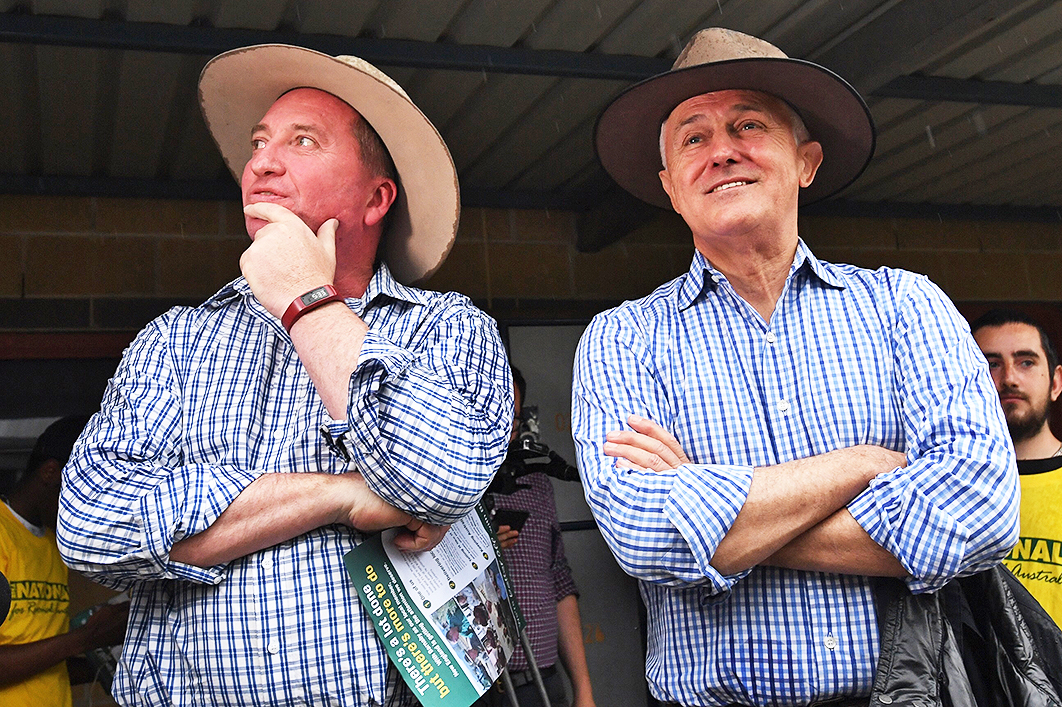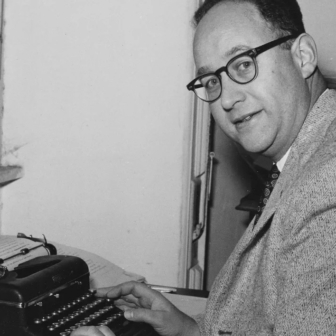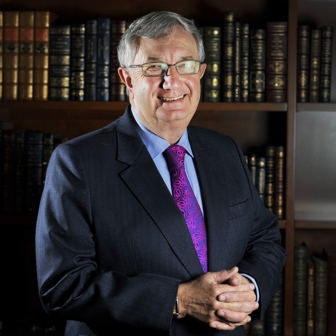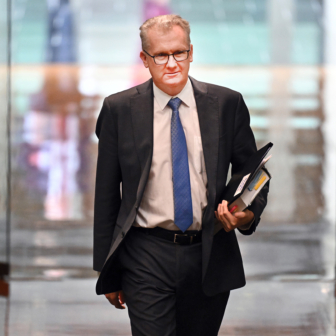Weatherboard and Iron: Politics, the Bush and Me
By Barnaby Joyce | New Holland | $32.99 | 208 pages
In a bleak year for Australian politics, those who saw the fall of Barnaby Joyce as some rare silver lining might yet turn out to be disappointed. At the time of writing, rumours were circulating of yet another leadership spill — this one in the federal National Party — while Michael McCormack, despite being party leader, remains in the political obscurity from which he was never really plucked.
Joyce has made it clear that he would not be averse to a comeback. The Australian’s Chris Kenny was not wildly exaggerating when he called Joyce “the spiritual head” of the National Party, but that might not be complimentary either to Joyce or to the party. And the path might not be entirely smooth: rural women appear to have remained angry about Joyce’s behaviour — not just the relationship with staffer Vikki Campion that made a wreck of his marriage, but also the alleged sexual harassment that a party inquiry was unable to resolve.
What would a born-again Joyce leadership look like? If this hastily assembled memoir is any indication, the most plausible answer is very unpleasant. Weatherboard and Iron is stuffed full of manufactured resentment against the cosmopolitan urban elites who are apparently responsible for all the ills of the bush, of the nation and — most importantly of all — of Barnaby himself.
The very title of the book is based on the conceit that Australia is socially stratified according to the materials out of which your home is made: “fibro and iron, then weatherboard and iron, tile and weatherboard, brick and iron, then brick and tile.” Joyce apparently sees himself as representing the “poor whites” stuck at stage two of that progression. The racialisation of his constituency is one of the many distasteful features of an often-distasteful book, though it’s probably little more than a Brexit- and Trump-inspired political fishing expedition by a failed leader. We should not give Joyce credit for originality that he doesn’t deserve.
So who are the enemies of these “poor whites” of the Great Australian Bush? They are the guys (not blokes) who wear imported silk ties and designer watches, and the girls who buy clothes with exposed brand names (where has Joyce been since the 1980s?) and hang around coffee shops in their “active wear.” Loitering in an airport bookshop is another sign of urban privilege — as distinct, we must assume, from hanging around the Qantas Chairman’s Lounge. You are among the favoured if you went to school at “St Michael’s” as distinct from “Turdsville State” (though Barnaby boarded at Riverview). The ABC, apparently, “is for those who can see the CBD,” unless you are little Barnaby watching “a hazily displayed form of the ABC” in Danglemah, New England, in the 1970s.
Predictably, Joyce hates environmentalists and animal rights activists (“Veganism and vegetation laws are very handy if we are going to evolve into a higher form of termite”) and any concern about climate change will immediately mark you as one of the pampered, out-of-touch city elites with a weakness for fashionable causes. In what he now calls “dramatic overreach,” Joyce famously opposed Kevin Rudd’s proposal for an emissions trading scheme by claiming that a roast might cost $100; others might call it a bare-faced lie. He still believes saving the Franklin River was a bad idea (“the triumph of the bearded kayaker over the poor, regional Tasmanian town”).
Among his many apparently well-cultivated hatreds, he has a peculiar animus against sociology graduates. Did a sociologist back in the 1980s make life unpleasant at the University of New England? (Yes, our “man of the people” has a university degree.) “A person on $200,000 a year, educated at Macquarie University in political science, sending a report to another on $300,000 a year, a sociology alumnus of Sydney University — both of whom live in Canberra — is not going to solve the problems of lice and ice for the kiddies in these towns.” Here surely is a good advertisement for political science at Macquarie — you might get to earn about the same salary as Joyce after he has suffered catastrophic career failure — and it is a splendid ad for sociology, if unlikely to be based on reliable graduate destinations data.
But never mind: Joyce isn’t much into data, as the disastrous saga of the move of the Australian Pesticides and Veterinary Medicines Authority, or APVMA, from Canberra to Armidale, in Joyce’s electorate, has shown only too well. Nor is he much into consistency. He rails at the idea that people living in the bush should be expected to move to find work, but the outcry about the APVMA “shows just how soft and entitled Australia has become.” Another interpretation of that outcry might be that many of us are fed up with venal pork-barrelling, but the colossal waste of money and talent involved in this effort to spread government largesse is small beer compared with what Joyce would do if he were ever given a full set of keys to the Treasury — at least if the ideas he outlines in Weatherboard and Iron are any indication.
If taken at his word, Joyce would build hydroelectric dams and coal-fired power stations across rural and regional Australia. He would build a new city in the Kimberley, with Canberra apparently the model. (Even Gough Whitlam attracts a few kind words for his interest in decentralisation.) The planned Inland Rail will apparently “grow Parkes, Narrabri, Wodonga, Moree and Goondiwindi” — though Joyce is rather hazy about how or why all this growth will happen, or by how much — and the miserly plans for a Melbourne-to-Brisbane line should be extended to take in Toowoomba to Gladstone, and Mount Isa to Tennant Creek. More roads should be built across the breadth of the continent because we only have a paltry pair. Tax concessions should be used to develop the land of milk and honey. Joyce doesn’t explain how all of this will be paid for, or why — beyond development for its own sake — it is necessary or desirable.
Joyce’s image of regional Australia is retrograde. His own electorate of New England is dominated by the large and sophisticated towns of Tamworth and Armidale, but you’d hardly know it. Like most of the rest of Australia, a majority of its voters supported marriage equality in the postal survey. Joyce’s nostalgic Country Party vision even takes in the hoary old idea of establishing new states. Indeed, there is barely a half-baked idea from the medical kit of Dr Earle Page (Country Party leader 1921–39) that Joyce is not prepared to dust off, shine up and present to a new audience as bright, shiny and dazzling, presumably in the hope that they know as little of Australian history and basic economics as he does.
Much of it is old-fashioned city-bashing, of course — the kind of politics that complained loudly about building a bridge across Sydney Harbour while calling for one over the Clarence — but it is also firmly in the tradition of anti-political politics. It is the sleight of hand that allows one to complain of “the cold, calculating heart of the politician,” in Joyce’s phrase, while making political hay as long as the sun shines — preferably, in the eyes of the voters.
That is not the only sleight of hand. Joyce has been a man of celebrity, consequence and power — someone who was able, for instance, to threaten to euthanase a Hollywood star’s dogs. He counts among his friends and supporters the country’s richest woman, Gina Rinehart, a mining magnate whose political and ethical antennae detected nothing amiss in handing over a cheque for $40,000 as a “prize” while Joyce was trying to recover the New England seat he’d been forced to vacate temporarily when it turned out he’d inherited New Zealand citizenship from his father. (Joyce eventually turned down the prize.) It is no wonder he thinks “we need twenty Ginas making money and paying their tax in Australia but instead we have this tall poppy syndrome that shuns success.” Elsewhere, he helpfully warns that we “need to be aware of the influence of vested interests and their corporate interwoven nature with politicians.” Amen to that, at least.
None of this prevents Joyce from posing in this book as the eternal outsider, the man who was given admission to a particularly seedy nightclub full of self-serving careerists, didn’t like what he saw, and is now determined to tell the truth to power. He is contemptuous of political staffers — except apparently his own — who “are overwhelmingly furnished by the same capital city clique.” Educated in the better schools, they “believe working in Canberra is some new episode of The West Wing or Game of Thrones or House of Cards.” (Happily, Joyce omits mention of Sex and the City.) In relation to the Nationals, he gives himself the credit for having “changed the culture from the old school, wool tie, picnic race club boys, to something vastly more reflective of the people we actually represent.” There is indeed something in this claim: Joyce’s early independent-mindedness as a senator undoubtedly shook up Coalition politics, injecting a renegade and populist note that had been hard to discern in a succession of well-integrated and well-behaved National Party leaders, determined not to make the kind of trouble that Joh Bjelke-Petersen had fomented back in 1987.
Weatherboard and Iron has not, it seems, sold well. After all the media coverage of Joyce’s private life, people are probably heartily sick of hearing about him. Anyone expecting grand revelations about the scandal in which he starred will be disappointed — and it is in the nature of political memoir today that anything salacious will be revealed in the media anyway, thereby obviating the need to fork out for the book. To be fair, Joyce is also sparing in the amount of dirt he dishes out on enemies such as Malcolm Turnbull, who did so much to bring Joyce undone (when he was not undoing himself). There is perhaps a little too much self-pity in the latter part of the book, amid some discussion of the self-destructive life he made for himself in Canberra. In a book where a great deal seems contrived for political effect, these passages seem the most honest, and they are certainly the rawest. Also notable, earlier in the book, are the somewhat coy references to his parents, who for some reason apparently objected to his marriage to Natalie, refusing even to attend the wedding. There is pain here that Joyce touches on without being willing to explore in any depth.
One last thing needs to be said about Weatherboard and Iron. It is among the worst-written pieces of nonfiction I’ve read for many years. The grammar and punctuation are sometimes dreadful, the author in several instances seems to have little idea of how to construct a paragraph, and the prose almost completely lacks rhythm, style or polish. No doubt such schoolmasterly criticism marks this reviewer as an over-educated idiot. Joyce knows the type: “shelves filled with books that they have probably never read but by gosh they look good. If you have read the review, that’s good enough to stick it on the shelf.” If my criticism seems unfair, it is worth considering that Joyce has the chutzpah to complain elsewhere in the book about the poor educational standards caused by the radical wing of the teachers’ union and fashionable pedagogy.
Joyce is fond of the snakes-and-ladders analogy and — with his paltry backbencher’s salary — apparently sees himself as occupying “a bottom square.” It is clear enough that he doesn’t intend being there long. Indeed, so dire and disorganised is the current state of our politics that only the very bold would rule out the possibility that Joyce, before long, will be making his way up those ladders again. If this book provides any indication of what he intends doing if he gets there, the result is likely to be reactionary, populist and ugly. •




